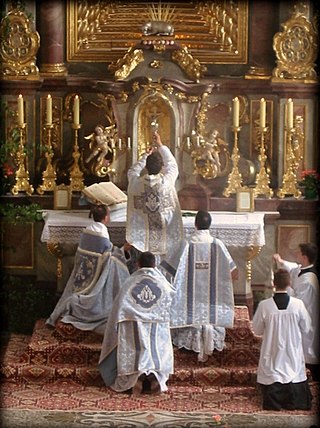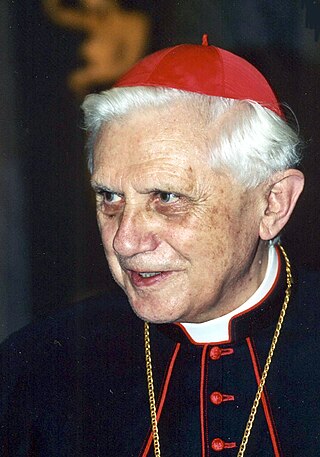Related Research Articles

Marcel François Marie Joseph Lefebvre was a French Catholic archbishop who greatly influenced modern traditionalist Catholicism. In 1970, five years after the close of the Second Vatican Council, he founded the Society of Saint Pius X (SSPX), a community to train seminarians in the traditional manner, in the village of Écône, Switzerland. In 1988, Pope John Paul II declared that Archbishop Lefebvre had "incurred the grave penalty of excommunication envisaged by ecclesiastical law" for consecrating four bishops against the pope's express prohibition but, according to Lefebvre, in reliance on an "agreement given by the Holy See ... for the consecration of one bishop."

The Dicastery for the Doctrine of the Faith (DDF) is a department of the Roman Curia in charge of the religious discipline of the Catholic Church. The Dicastery is the oldest among the departments of the Roman Curia. Its seat is the Palace of the Holy Office in Rome. It was founded to defend the Catholic Church from heresy and is the body responsible for promulgating and defending Catholic doctrine.

Traditionalist Catholicism is a movement that emphasizes beliefs, practices, customs, traditions, liturgical forms, devotions and presentations of teaching associated with the Catholic Church before the Second Vatican Council (1962–1965). Traditionalist Catholics particularly emphasize the Tridentine Mass, the Roman Rite liturgy largely replaced in general use by the post-Second Vatican Council Mass of Paul VI.

The Society of Saint Pius X is a canonically irregular traditionalist Catholic priestly fraternity founded in 1970 by Archbishop Marcel Lefebvre. Lefebvre was a leading traditionalist at the Second Vatican Council with the Coetus Internationalis Patrum and Superior General of the Holy Ghost Fathers until 1968. The society was established as a pious union of the Catholic Church with the permission of François Charrière, the Bishop of Lausanne, Geneva and Fribourg in Switzerland.

Humanum genus is a papal encyclical promulgated on 20 April 1884 by Pope Leo XIII.
The Catholic Church first prohibited Catholics from membership in Masonic organizations and other secret societies in 1738. Since then, at least eleven popes have made pronouncements about the incompatibility of Catholic doctrines and Freemasonry.
In eminenti apostolatus specula is a papal bull issued by Pope Clement XII on 28 April 1738, banning Catholics from becoming Freemasons. It arose from Jacobite-Hanoverian rivalry on the continent.
Ecclesia Dei is the document Pope John Paul II issued on 2 July 1988 in reaction to the Ecône consecrations, in which four priests of the Society of Saint Pius X were ordained as bishops despite an express prohibition by the Holy See. The consecrating bishop and the four priests consecrated were excommunicated. John Paul called for unity and established the Pontifical Commission Ecclesia Dei to foster a dialogue with those associated with the consecrations who hoped to maintain both loyalty to the papacy and their attachment to traditional liturgical forms.
Latae sententiae and ferendae sententiae are ways sentences are imposed in the Catholic Church in its canon law.
The Declaration Concerning Status of Catholics Becoming Freemasons is a February 1981 declaration by the Congregation for the Doctrine of the Faith under Cardinal Franjo Šeper which restated the Catholic Church's prohibition against Catholics becoming Freemasons.
The Letter to U.S. Bishops Concerning Masonry was a letter sent on April 19, 1985, by Bernard Francis Cardinal Law, Archbishop of Boston and chairman of the Committee on Pastoral Research and Practices of the United States Catholic Conference. The letter was intended to answer confusion about the admissibility of Masonic membership.
While many Christian denominations either allow or take no stance on their members joining Freemasonry, others discourage or prohibit their members from joining the fraternity.

Joseph Ratzinger (1927–2022) was named by Pope John Paul II on 25 November 1981 as prefect of the Congregation for the Doctrine of the Faith (CDF) formerly known as the Holy Office and, especially around the 16th century, as the Roman Inquisition.

The Écône consecrations were Catholic episcopal consecrations in Écône, Switzerland, on 30 June 1988 performed by Archbishop Marcel Lefebvre and Bishop Antônio de Castro Mayer. The bishops consecrated were four priests of Lefebvre's Society of Saint Pius X (SSPX). The consecrations, performed against the explicit orders of Pope John Paul II, represented a milestone in the troubled relationship of Lefebvre and the SSPX with the Church leadership. The Holy See's Congregation for Bishops issued a decree signed by its Prefect Cardinal Bernardin Gantin declaring that Lefebvre and De Castro Mayer had incurred automatic excommunication by consecrating the bishops without papal consent, thus putting himself and his followers in schism.
Rosario Francesco Esposito, SSP was an Italian Pauline priest known for joining Freemasonry. He dismissed the Church ban on membership in the Masonic lodge, saying that it is “a thing of the past.”

The 1983 Code of Canon Law, also called the Johanno-Pauline Code, is the "fundamental body of ecclesiastical laws for the Latin Church". It is the second and current comprehensive codification of canonical legislation for the Latin Church of the Catholic Church. The 1983 Code of Canon Law was promulgated on 25 January 1983 by John Paul II and took legal effect on the First Sunday of Advent 1983. It replaced the 1917 Code of Canon Law which had been promulgated by Benedict XV on 27 May 1917.
De delictis gravioribus is a letter written on 18 May 2001 by Cardinal Joseph Ratzinger, Prefect of the Congregation for the Doctrine of the Faith, to all the Bishops of the Catholic Church and the other Ordinaries concerned, including those of the Eastern Catholic Churches.
Canon 915, one of the canons in the 1983 Code of Canon Law of the Latin Church of the Catholic Church, forbids the administration of Holy Communion to those upon whom the penalty of excommunication or interdict has been imposed or declared, or who obstinately persist in manifest grave sin:
Those who have been excommunicated or interdicted after the imposition or declaration of the penalty and others obstinately persevering in manifest grave sin are not to be admitted to holy communion.
The canonical situation of the Society of Saint Pius X (SSPX), a group founded in 1970 by Archbishop Marcel Lefebvre, is unresolved. The Society of Saint Pius X has been the subject of much controversy since 1988, when Bernard Fellay, Bernard Tissier de Mallerais, Richard Williamson and Alfonso de Galarreta were illicitly consecrated as bishops at Ecône, at the International Seminary of Saint Pius X, in violation of canon law. Lefebvre and the four other SSPX bishops individually incurred a disciplinary latae sententiae excommunication for this schismatic act. The excommunications of the four living SSPX bishops were remitted in 2009.
Decree on the Attempted Ordination of Some Catholic Women is a canonical decree issued by the Congregation for the Doctrine of the Faith, under Cardinal Joseph Ratzinger, and approved by Pope John Paul II on December 21, 2002. It can be found in Acta Apostolicae Sedis 95 (2003). The decree is in response to Romulo Antonio Braschi ordaining seven Catholic women to the priesthood of his movement, the Catholic Apostolic Charismatic Church of Jesus the King, on June 29, 2002, and is a follow-up to a decree of excommunication of Braschi and the women issued on August 5, 2002.
References
Notes
- ↑ Pope Clement XII (1738-04-28). "In eminenti". Archived from the original on 2011-06-11. Retrieved 2009-02-18.
- ↑ "Delicts against ecclesiastical authorities and the freedom of the Church (Cann. 1370 - 1377)". 1983 Code of Canon Law. 1983. Archived from the original on 2008-02-19.
- ↑ "Declaration on Masonic Associations Nov 26, 1983". www.vatican.va. Retrieved 2020-11-24.
- ↑ Canon 16 of the 1983 code.
- ↑ Eugen Lennhoff/Oskar Posner/Dieter Binder: Internationales Freimaurer-Lexikon. Munich 2011. Entry on "Katholizismus, Katholische Kirche".
Sources
- "Declaratio de associationibus massonici", Acta Apostolicae Sedis 76 (1984) 300. (From EV, No. 553, pp. 482–87)
- Declaration on Masonic Associations, Congregation for the Doctrine of the Faith, Holy See
- Canon Law, A Text and Commentary. T. Lincoln Bouscaren, S.J.; Adam C. Ellis, S.J.; Francis N. Korth, S.J.. Fourth Revised Edition, The Bruce Publishing Company, Milwaukee: 1963 [Imprimatur: + William E. Cousins, Archbishop of Milwaukee] LoCCN: 63-22295.
- Clarification Concerning Status of Catholics Becoming Freemasons
- https://web.archive.org/web/20080223135713/https://www.vatican.va/archive/cdc/index.htm
- https://web.archive.org/web/20060924182559/http://www.catholiculture.net/docs/doc_view.cfm?recnum=5285